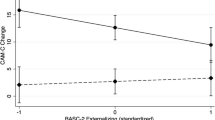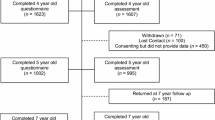Abstract
The purpose of the study was to a) examine school readiness (SR) outcomes in preschoolers with externalizing behavior problems (EBPs) and language impairment (LI) after receiving an intensive multidisciplinary SR intervention and b) examine changes in language as predictors of improvements in SR treatment outcomes via an open trial design. Preschoolers (n = 91) with elevated levels of EBPs and comorbid LI (Mage=4.77, SD= .56, 76% male, 82% Hispanic/Latino) participated in an 8-week Summer Treatment Program for Pre-Kindergarteners and received speech therapy for 30 min/4 days a week. SR outcomes included language, behavioral, academic, social, and self-regulation measures. Paired sample T-tests revealed significant improvements across SR outcomes. Regression analyses demonstrated that changes in language were associated with changes in academic and executive functioning. Findings indicated that children with comorbid EBPs and LI made significant improvements across SR domains through a multidisciplinary SR intervention. Implications for early intervention for children with EBPs and LI, are discussed.
Similar content being viewed by others
References
Adesope, O. O., Lavin, T., Thompson, T., & Ungerleider, C. (2010). A systematic review and meta-analysis of the cognitive correlates of bilingualism. Review of Educational Research, 80(2), 207–245.
Angold, A., & Egger, H. L. (2007). Preschool psychopathology: lessons for the lifespan. Journal of Child Psychology and Psychiatry, 48(10), 961–966.
ASHA (2018). Types of Services. Retrieved March 29, 2018, https://www.asha.org/NJC/Types-of-Services/
Beitchman, J., Tuckett, M., & Batth, S. (1987). Language delay and hyperactivity in preschoolers: Evidence for a distinct subgroup of hyperactives. Canadian Journal of Psychiatry, 32(8), 683–687.
Biederman, J., Mick, E., Faraone, S. V., Braaten, E., Doyle, A., Spencer, T., et al. (2002). Influence of gender on attention deficit hyperactivity disorder in children referred to a psychiatric clinic. American Journal of Psychiatry, 159(1), 36–42.
Bierman, K. L., Domitrovich, C. E., Nix, R. L., Gest, S. D., Welsh, J. A., Greenberg, M. T., & Gill, S. (2008). Promoting academic and social-emotional school readiness: The Head Start REDI program. Child Development, 79(6), 1802–1817.
Bowyer-Crane, C., Snowling, M. J., Duff, F., & Hulme, C. (2011). Response to Early Intervention of Children with Specific and General Language Impairment. Learning Disabilities: A Contemporary Journal, 9(2), 107–121.
BRACKEN, B. (2002). Manual Bracken School Readiness Assessment.
Campbell, S. B., & Ewing, L. J. (1990). Follow-up of hard-to-manage preschoolers: adjustment at age 9 and predictors of continuing symptoms. Journal of Child Psychology and Psychiatry, 31(6), 871–889.
Cantwell, D. P., & Baker, L. (Eds.). (1991). Psychiatric and developmental disorders in children with communication disorder. Amer Psychiatric Pub Incorporated.
Carbonneau, R., Boivin, M., Brendgen, M., Nagin, D., & Tremblay, R. E. (2016). Comorbid development of disruptive behaviors from age 1½ to 5 years in a population birth-cohort and association with school adjustment in first grade. Journal of Abnormal Child Psychology, 44(4), 677–690.
Cizek, G. J. (2003). Detecting and preventing classroom cheating: Promoting integrity in assessment. Corwin Press.
Cohen, N. J., Menna, R., Vallance, D. D., Barwick, M. A., Im, N., & Horodezky, N. B. (1998). Language, social cognitive processing, and behavioral characteristics of psychiatrically disturbed children with previously identified and unsuspected language impairments. The Journal of Child Psychology and Psychiatry and Allied Disciplines, 39(6), 853–864.
Cohen, N. J., Vallance, D. D., Barwick, M., Im, N., Menna, R., Horodezky, N. B., & Isaacson, L. (2000). The interface between ADHD and language impairment: An examination of language, achievement, and cognitive processing. The Journal of Child Psychology and Psychiatry and Allied Disciplines, 41(3), 353–362.
Comer, J. S., Chow, C., Chan, P. T., Cooper-Vince, C., & Wilson, L. A. (2013). Psychosocial treatment efficacy for disruptive behavior problems in very young children: A meta-analytic examination. Journal of the American Academy of Child and Adolescent Psychiatry, 52(1), 26–36.
Conti-Ramsden, G., & Botting, N. (2004). Social difficulties and victimization in children with SLI at 11 years of age. Journal of Speech, Language, and Hearing Research.
Denckla, M. B. (1996). A theory and model of executive function: A neuropsychological perspective.
Denham, S. A. (2006). Social-emotional competence as support for school readiness: What is it and how do we assess it? Early Education and Development, 17(1), 57–89.
Denham, S. A., Blair, K. A., DeMulder, E., Levitas, J., Sawyer, K., Auerbach-Major, S., & Queenan, P. (2003). Preschool emotional competence: Pathway to social competence? Child Development, 74(1), 238–256.
Domitrovich, C. E., Cortes, R. C., & Greenberg, M. T. (2007). Improving young children’s social and emotional competence: A randomized trial of the preschool “PATHS” curriculum. The Journal of Primary Prevention, 28(2), 67–91.
Doyle, A., Ostrander, R., Skare, S., Crosby, R. D., & August, G. J. (1997). Convergent and criterion-related validity of the behavior assessment system for children-parent rating scale. Journal of Clinical Child Psychology, 26(3), 276–284.
Duncan, G. J., Dowsett, C. J., Claessens, A., Magnuson, K., Huston, A. C., Klebanov, P., & Sexton, H. (2007). School readiness and later achievement. Developmental Psychology, 43(6), 1428.
Egger, H. L., & Angold, A. (2006). Common emotional and behavioral disorders in preschool children: presentation, nosology, and epidemiology. Journal of Child Psychology and Psychiatry, 47(3–4), 313–337.
Eisenberg, N., Sadovsky, A., Spinrad, T. L., Fabes, R. A., Losoya, S. H., Valiente, C., et al. (2005). The relations of problem behavior status to children's negative emotionality, effortful control, and impulsivity: concurrent relations and prediction of change. Developmental Psychology, 41(1), 193.
Evans, S. W., Owens, J. S., Wymbs, B. T., & Ray, A. R. (2018). Evidence-based psychosocial treatments for children and adolescents with attention deficit/hyperactivity disorder. Journal of Clinical Child and Adolescent Psychology, 47(2), 157–198.
Fabiano, G. A., Pelham Jr., W. E., Waschbusch, D. A., Gnagy, E. M., Lahey, B. B., Chronis, A. M., et al. (2006). A practical measure of impairment: Psychometric properties of the impairment rating scale in samples of children with attention deficit hyperactivity disorder and two school-based samples. Journal of Clinical Child and Adolescent Psychology, 35, 369–385.
Flanagan, D. P., Alfonso, V. C., Primavera, L. H., Povall, L., & Higgins, D. (1996). Convergent validity of the BASC and SSRS: Implications for social skills assessment. Psychology in the Schools, 33(1), 13–23.
Garcia, A. M., Ros, R., Hart, K. C., & Graziano, P. A. (2018). Comparing working memory in bilingual and monolingual Hispanic/Latino preschoolers with disruptive behavior disorders. Journal of Experimental Child Psychology, 166, 535–548.
Graziano, P. A., & Hart, K. (2016). Beyond behavior modification: benefits of social–emotional/self-regulation training for preschoolers with behavior problems. Journal of School Psychology, 58, 91–111.
Graziano, P. A., Reavis, R. D., Keane, S. P., & Calkins, S. D. (2007). The role of emotion regulation in children's early academic success. Journal of School Psychology, 45(1), 3–19.
Graziano, P. A., Slavec, J., Hart, K., Garcia, A., & Pelham, W. E. (2014). Improving school readiness in preschoolers with behavior problems: Results from a summer treatment program. Journal of Psychopathology and Behavioral Assessment, 36(4), 555–569.
Graziano, P. A., Ros, R., Hart, K. C., & Slavec, J. (2018). Summer treatment program for preschoolers with externalizing behavior problems: A preliminary examination of parenting outcomes. Journal of Abnormal Child Psychology, 46(6), 1253–1265.
Grizzle, K. L., & Simms, M. D. (2009). Language and learning: a discussion of typical and disordered development. Current Problems in Pediatric and Adolescent Health Care, 39(7), 168.
Hair, E., Halle, T., Terry-Humen, E., Lavelle, B., & Calkins, J. (2006). Children's school readiness in the ECLS-K: Predictions to academic, health, and social outcomes in first grade. Early Child Research Quarterly, 21(4), 431–454.
Hart, K. I., Fujiki, M., Brinton, B., & Hart, C. H. (2004). The relationship between social behavior and severity of language impairment. Journal of Speech: Language, and Hearing Research.
Hartas, D. (2012). Children’s social behaviour, language and literacy in early years. Oxford Review of Education, 38(3), 357–376.
Henry, L. A., Messer, D. J., & Nash, G. (2012). Executive functioning in children with specific language impairment. Journal of Child Psychology and Psychiatry, 53(1), 37–45.
Humphries, T., Koltun, H., Malone, M., & Roberts, W. (1994). Teacher-identified oral language difficulties among boys with attentional problems. Journal of Developmental and Behavioral Pediatrics.
Im-Bolter, J., & Pascual L. (2006). Processing limitations in children with specific language impairment: The role of executive function. Child Development, 77(6), 1822–1841.
Individuals With Disabilities Education Act (IDEA), 20 U.S.C. § 1400 (2004).
Justice, L. M., Mashburn, A. J., Hamre, B. K., & Pianta, R. C. (2008). Quality of language and literacy instruction in preschool classrooms serving at-risk pupils. Early Child Research Quarterly, 23(1), 51–68.
Justice, L. M., Bowles, R. P., Pence Turnbull, K. L., & Skibbe, L. E. (2009). School readiness among children with varying histories of language difficulties. Developmental Psychology, 45(2), 460.
Kagan, S. L., Moore, E., & Bredekamp, S. (1995). Reconsidering children’s early learning and development: Toward shared beliefs and vocabulary.
Keane, S. P., & Calkins, S. D. (2004). Predicting kindergarten peer social status from toddler and preschool problem behavior. Journal of Abnormal Child Psychology, 32(4), 409–423.
Kusche, C. A., & Greenberg, M. T. (1994). The PATHS curriculum. South Deerfield: ChanningBete Co.
La Greca, A. M., Silverman, W. K., & Lochman, J. E. (2009). Moving beyond efficacy and effectiveness in child and adolescent intervention research. Journal of Consulting and Clinical Psychology, 77(3), 373.
Law, J., Garrett, Z., & Nye, C. (2004). The efficacy of treatment for children with developmental speech and language delay/disorder. Journal of Speech, Language, and Hearing Research.
Leonard, L. B., Weismer, S. E., Miller, C. A., Francis, D. J., Tomblin, J. B., & Kail, R. V. (2007). Speed of processing, working memory, and language impairment in children. Journal of Speech, Language, and Hearing Research, 50(2), 408–28.
Lonigan, C. J., Burgess, S. R., & Anthony, J. L. (2000). Development of emergent literacy and early reading skills in preschool children: evidence from a latent-variable longitudinal study. Developmental Psychology, 36(5), 596.
Lonigan, C. J., Lerner, M. D., Goodrich, J. M., Farrington, A. L., & Allan, D. M. (2016). Executive function of Spanish-speaking language-minority preschoolers: Structure and relations with early literacy skills and behavioral outcomes. Journal of Experimental Child Psychology, 144, 46–65.
Loucas, T., Charman, T., Pickles, A., Simonoff, E., Chandler, S., Meldrum, D., & Baird, G. (2008). Autistic symptomatology and language ability in autism spectrum disorder and specific language impairment. Journal of Child Psychology and Psychiatry, 49(11), 1184–1192.
Massetti, G. M., Lahey, B. B., Pelham, W. E., Loney, J., Ehrhardt, A., Lee, S. S., & Kipp, H. (2008). Academic achievement over 8 years among children who met modified criteria for attention-deficit/hyperactivity disorder at 4–6 years of age. Journal of Abnormal Child Psychology, 36(3), 399–410.
Mayes, S. D., Calhoun, S. L., & Crowell, E. W. (2000). Learning disabilities and ADHD: Overlapping spectrum disorders. Journal of Learning Disabilities, 33(5), 417–424.
McClelland, M. M., Morrison, F. J., & Holmes, D. L. (2000). Children at risk for early academic problems: The role of learning-related social skills. Early Child Research Quarterly, 15(3), 307–329.
McClelland, M. M., Acock, A. C., & Morrison, F. J. (2006). The impact of kindergarten learning-related skills on academic trajectories at the end of elementary school. Early Child Research Quarterly, 21(4), 471–490.
Morales, J., Calvo, A., & Bialystok, E. (2013). Working memory development in monolingual and bilingual children. Journal of Experimental Child Psychology, 114(2), 187–202.
Mueller, K. L., & Tomblin, J. B. (2012). Examining the comorbidity of language disorders and ADHD. Topics in Language Disorders, 32(3), 228.
Panter, J. E., & Bracken, B. A. (2009). Validity of the Bracken School Readiness Assessment for predicting first grade readiness. Psychology in the Schools, 46(5), 397–409.
Pelham Jr., W. E., & Fabiano, G. A. (2008). Evidence-based psychosocial treatments for attention-deficit/hyperactivity disorder. Journal of Clinical Child and Adolescent Psychology, 37(1), 184–214.
Ponitz, C. E. C., McClelland, M. M., Jewkes, A. M., Connor, C. M., Farris, C. L., & Morrison, F. J. (2008). Touch your toes! Developing a direct measure of behavioral regulation in early childhood. Early Child Research Quarterly, 23(2), 141–158.
Redmond, S. s., Ash, A. C., Hogan, T. P., Nippold, M., & Pruitt-Lord, S. (2015). Consequences of Co-Occurring Attention-Deficit/Hyperactivity Disorder on Children's Language Impairments. Language, Speech & Hearing Services In Schools, 46(2), 68–80. https://doi.org/10.1044/2014_LSHSS-14-0045.
Reynolds, C. R., & Kamphaus, R. W. (1992). Behavior assessment system for children. Parent rating scales. Circle Pines, MN: American Guidance Service.
Reynolds, C. R., & Kamphaus, R. W. (2004). Behavior assessment for children, (BASC-2). Circle Pines, MN: American Guidance Service.
Sandoval, W. A., & Morrison, K. (2003). High school students' ideas about theories and theory change after a biological inquiry unit. Journal of Research in Science Teaching: The Official Journal of the National Association for Research in Science Teaching, 40(4), 369–392.
Sanger, D., Moore-Brown, B. J., Montgomery, J., & Hellerich, S. (2004). Speech-language pathologists’ opinions on communication disorders and violence. Language, Speech, and Hearing Services in Schools.
Sciberras, E., Mueller, K. L., Efron, D., Bisset, M., Anderson, V., Schilpzand, E. J., & Nicholson, J. M. (2014). Language problems in children with ADHD: A community-based study. Pediatrics, 133(5), 793–800.
Shields, A., & Cicchetti, D. (1997). Emotion regulation among school-age children: The development and validation of a new criterion Q-sort scale. Developmental Psychology, 33(6), 906.
Shriberg, L. D., Tomblin, J. B., & McSweeny, J. L. (1999). Prevalence of speech delay in 6-year-old children and comorbidity with language impairment. Journal of Speech, Language, and Hearing Research, 42(6), 1461–1481.
Skibbe, L. E., Justice, L. M., Zucker, T. A., & McGinty, A. S. (2008). Relations among maternal literacy beliefs, home literacy practices, and the emergent literacy skills of preschoolers with specific language impairment. Early Education and Development, 19(1), 68–88.
Snowling, M. J., Bishop, D. V. M., Stothard, S. E., Chipchase, B., & Kaplan, C. (2006). Psychosocial outcomes at 15 years of children with a preschool history of speech-language impairment. Journal of Child Psychology and Psychiatry, 47(8), 759–765.
Tirosh, E., & Cohen, A. (1998). Language deficit with attention-deficit disorder: A prevalent comorbidity. Journal of Child Neurology, 13(10), 493–497.
Tomblin, J. B., & Mueller, K. L. (2012). How can comorbidity with attention-deficit/hyperactivity disorder aid understanding of language and speech disorders? Topics in Language Disorders, (3), 198.
Vallance, D. D., Cummings, R. L., & Humphries, T. (1998). Mediators of the risk for problem behavior in children with language learning disabilities. Journal of Learning Disabilities, 31(2), 160–171.
Webster-Stratton, C. (2000). The incredible years training series (pp. 1–24). Washington, DC: US Department of Justice, Office of Justice Programs, Office of Juvenile Justice and Delinquency Prevention.
Webster-Stratton, C., Reid, M., & Stoolmiller, M. (2008). Preventing conduct problems and improving school readiness: evaluation of the incredible years teacher and child training programs in high-risk schools. Journal of Child Psychology and Psychiatry, 49(5), 471–488.
Webster-Stratton, C., Reid, M. J., Weisz, J. R., & Kazdin, A. E. (2010). Evidence-based psychotherapies for children and adolescents. Guilford Publications, New York.
Wechsler, D. (2012). Wechsler Preschool and Primary Scales of Intelligence (WPPSI-IV).
Weiss, M., Worling, D., & Wasdell, M. (2003). A chart review study of the inattentive and combined types of ADHD. Journal of Attention Disorders, 7(1), 1–9.
Woodcock, R. W., McGrew, K. S., & Mather, N. (2001). WJ-III tests of achievement. Itasca: Riverside Publishing.
Zentall, S. S., Cassady, J. C., & Javorsky, J. (2001). Social comprehension of children with hyperactivity. Journal of Attention Disorders, 5(1), 11–24.
Zimmerman, I. L., Steiner, V. G., & Pond, R. E. (2011). PLS-5: Preschool language scale-5 San Antonio. In TX: Psychological Corporation.
Acknowledgements
The research reported here was supported by the Institute of Education Sciences, U.S. Department of Education, through Grant R324A120136, and The Children’s Trust. The opinions expressed are those of the authors and do not represent the views of the Institute, the U.S. Department of Education, or The Children’s Trust. The authors wouldlike to thank the families who participated in the study and the students and staff that made the program possible.
Author information
Authors and Affiliations
Corresponding author
Additional information
Publisher’s Note
Springer Nature remains neutral with regard to jurisdictional claims in published maps and institutional affiliations.
Rights and permissions
About this article
Cite this article
Gregg, D.E., Hart, K.C., Vaquerano, S. et al. Multidisciplinary Early Intervention for Preschoolers with Externalizing Behavior Problems and Language Impairment: Results from an Open Trial. J Psychopathol Behav Assess 43, 506–517 (2021). https://doi.org/10.1007/s10862-020-09865-w
Accepted:
Published:
Issue Date:
DOI: https://doi.org/10.1007/s10862-020-09865-w




